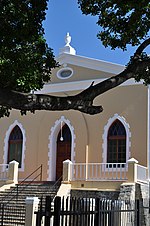Nurul Islam Mosque
1844 establishments in the Cape ColonyAfrican mosque stubsMosques in Cape TownReligious buildings and structures completed in 1844South African building and structure stubs

The Nurul Islam Mosque is a mosque in the Bo-Kaap area of Cape Town, South Africa. When it was founded in 1844, the structure could hold 150 worshipers. Renovated in 2001, it can now hold 700 worshipers.
Excerpt from the Wikipedia article Nurul Islam Mosque (License: CC BY-SA 3.0, Authors, Images).Nurul Islam Mosque
Buitengracht Street, Cape Town Bo-Kaap (Schotschekloof)
Geographical coordinates (GPS) Address Phone number External links Nearby Places Show on map
Geographical coordinates (GPS)
| Latitude | Longitude |
|---|---|
| N -33.921944444444 ° | E 18.415555555556 ° |
Address
Nurul Islam Mosque
Buitengracht Street 134
8001 Cape Town, Bo-Kaap (Schotschekloof)
Western Cape, South Africa
Open on Google Maps








